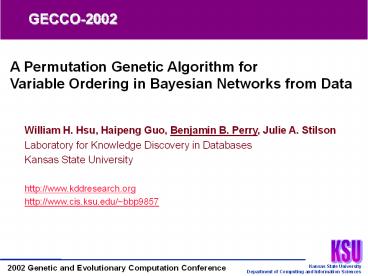CIS732-Lecture-13-20011004 - PowerPoint PPT Presentation
1 / 18
Title:
CIS732-Lecture-13-20011004
Description:
Kansas State University. Department of Computing and Information Sciences ... BBN model for patient monitoring in surgical anesthesia ... – PowerPoint PPT presentation
Number of Views:12
Avg rating:3.0/5.0
Title: CIS732-Lecture-13-20011004
1
GECCO-2002
A Permutation Genetic Algorithm for Variable
Ordering in Bayesian Networks from Data
William H. Hsu, Haipeng Guo, Benjamin B. Perry,
Julie A. Stilson Laboratory for Knowledge
Discovery in Databases Kansas State
University http//www.kddresearch.org http//www.
cis.ksu.edu/bbp9857
2
Overview
- Bayesian Network
- Definitions and examples
- Inference and learning
- Challenge of validating structures
- Learning Network Structure
- Problem
- K2 algorithm
- Improving K2 Permutation Genetic Algorithm
- Shortcoming greedy, sensitive to ordering
- Permutation GA
- Evaluation with Known Bayesian Networks
- Summary and Future Work
3
Bayesian Belief Networks (BBNS)Definition
- Bayesian Network
- Directed graph model of conditional dependence
assertions (or CI assumptions) - Vertices (nodes) denote events (each a random
variable) - Edges (arcs, links) denote conditional
dependencies - General Product (Chain) Rule for BBNs
- Example (Sprinkler BBN)
P(Summer, Off, Drizzle, Wet, Not-Slippery) P(S)
P(O S) P(D S) P(W O, D) P(N W)
4
Graphical Modelsof Probability Distributions
- Idea
- Want model that can be used to perform inference
- Desired properties
- Correlations among variables
- Ability to represent functional, logical,
stochastic relationships - Probability of certain events
- Inference Decision Support Problems
- Diagnosis (medical, equipment)
- Pattern recognition (image, speech)
- Prediction
- Want to Learn Most Likely Model that Generates
Observed Data - Under certain assumptions (Causal Markovity), it
has been shown that we can do it - Given data D (tuples or vectors containing
observed values of variables) - Return directed graph (V, E) expressing target
CPTs (or commitment to acquire)
5
Learning StructureK2 Algorithm
- Algorithm Learn-BBN-Structure-K2 (D, Max-Parents)
- FOR i ? 1 to n DO // arbitrary ordering of
variables x1, x2, , xn - WHILE (Parentsxi.Size lt Max-Parents) DO // find
best candidate parent - Best ? argmaxjgti (P(D xj ? Parentsxi) // max
Dirichlet score - IF (Parentsxi Best).Score gt
Parentsxi.Score) THEN Parentsxi Best - RETURN (Parentsxi i ? 1, 2, , n)
- A Logical Alarm Reduction Mechanism Beinlich et
al, 1989 - BBN model for patient monitoring in surgical
anesthesia - Vertices (37) findings (e.g., esophageal
intubation), intermediates, observables - K2 found BBN different in only 1 edge from gold
standard (elicited from expert)
6
Learning StructureDirichlet (Bayesian) Score
and K2 Algorithm
- Bayesian Score (aka Dirichlet Score) for Marginal
Likelihood P(D h) - K2 Algorithm for General Case Structure Learning
- Greedy, Bayesian score-based add arcs based upon
incremental gain each single arc induces in a
global score - See http//wilma.cs.brown.edu/research/ai/dynamic
s/tutorial/ - Learning for Decision Support in Policy-Making
- Does smoking cause cancer?
- Do school vouchers improve education?
- Does reduction of visa duration decrease risk of
terrorist activity?
7
GASLEAKA Permutation GA for Variable Ordering
8
Validation by Inference
9
Scores for Learning StructureThe Role of
Inference
Root Mean Square Error (RMSE)
10
Properties of the Genetic Algorithm
- Elitist
- Chromosome representation
- Integer permutation ordering
- Sample chromosome in a BBN of 5 nodes might look
like 3 1 2 0 4 - Seeding
- Random shuffle
- Operators
- Order crossover
- Swap mutation
- Fitness
- RMSE
- Job farm
- Java-based Utilize many machines regardless of
OS
11
Exhaustive Results
12
Results on Asia
13
Learning StructureCausal Discovery
14
Learning StructureCausal Discovery
15
Learning StructureCausal Discovery
16
Summary
- Bayesian Network
- Learning Structure
- K2 Problems
- GASLEAK
17
Future Work
- Fast Inference
- Larger networks
- Different Learning Algorithms
- Sparse candidate
- Tabu
- Different GA specs
- Mutation / Crossover rates
- Crossover type
- Partially matched
- Cycle
18
- Thanks for your attendance
- www.kddresearch.org
- www.ksu.edu
- www.cis.ksu.edu/bbp9857































